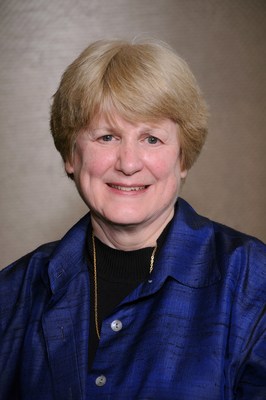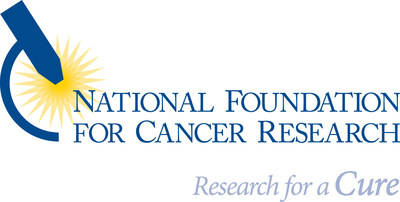BETHESDA, Md., Jan. 21, 2016 /PRNewswire-USNewswire/ -- The National Foundation for Cancer Research (NFCR) announced today that Mary-Claire King, Ph.D., University of Washington professor of medicine (medical genetics) and genome sciences has been awarded the 2016 Szent-Györgyi Prize for Progress in Cancer Research. Dr. King's pioneering research provided the first evidence of genetic predisposition to breast cancer.

NFCR's selection committee was unanimous in its decision to recognize Dr. King, whose work has proved foundational to the genetic understanding of cancer. In particular, her proof of existence of BRCA1 and the identification of its location made genetic screening for breast and ovarian cancers possible. Mary-Claire King's discoveries represent a fundamental step in the understanding of cancer and have changed the face of cancer prevention, screening, diagnosis and treatment.
"Dr. King is the true pioneer and world leader in the research that clearly demonstrated the genetic causes of breast and ovarian cancers by identifying the BRCA1 gene and its cancer-related mutations," said Dr. Fred Alt, Director, Program in Cellular and Molecular Medicine at Boston Children's Hospital, winner of the 2015 Szent-Györgyi Prize and Chair of this year's Prize Selection Committee. "Dr. King's work has opened a new field that allows scientists to investigate and understand breast and ovarian cancers and other types of genetic diseases with a much more effective approach."
Dr. King's discovery has led to the genotype-based breast cancer screening practice that can identify individuals who have inherited mutations in BRCA1 and give them a chance to take preventive measures at an early stage of their lives.
"I am honored and proud to be selected by the National Foundation for Cancer Research to receive this prestigious award," said Dr. King. "The research on BRCA1 gene demonstrated that genetics plays a critical role in cancer. The benefits brought to women and their families by understanding the role of genetics in cancer has encouraged me to address ever more challenging genetic questions of complex diseases."
"Dr. King's work has saved the lives of many people who have higher risk of breast and ovarian cancers than the general population because of the inherited BRCA1 mutations in their bodies," said Sujuan Ba, Ph.D., Co-chair of the 2016 Szent-Györgyi Prize Selection Committee and President of NFCR. "Thanks to Dr. King's research, genetic screening methods are now available to identify people at high risk and preventive and therapeutic approaches have been developed to treat breast and ovarian cancer more effectively.
Dr. King will be honored at an award ceremony held May 2, 2016 at The National Press Club in Washington, D.C. Media and the public are invited and encouraged to attend.
About the Szent-Györgyi Prize for Progress in Cancer Research
The Szent-Györgyi Prize for Progress in Cancer Research was established by the National Foundation for Cancer Research in honor of its co-founder, Albert Szent-Györgyi, M.D., Ph.D., recipient of the 1937 Nobel Prize for Physiology and Medicine.
The 2016 Szent-Györgyi Prize Selection Committee was chaired by Fred Alt, Ph.D. and co-chaired by Sujuan Ba, Ph.D. Other selection committee members included leaders in cancer research and drug development from academic institutes and biotech and pharmaceutical industries: Webster K. Cavenee, Ph.D., Ludwig Institute for Cancer Research; Sara A. Courtneidge, Ph.D., Oregon Health & Science University; Carlo M. Croce, M.D., The Ohio State University; Richard Gaynor, M.D., Eli Lilly; Susan B. Horwitz, Ph.D., Albert Einstein College of Medicine of Yeshiva University; Raju Kucherlapati, Ph.D., Harvard Medical School; Alex Matter, M.D., Experimental Therapeutics Center & D3, A*STAR, Singapore; Philip Tsichlis, M.D., Tufts University School of Medicine; Peter K. Vogt, Ph.D., The Scripps Research Institute; Irving L. Weissman, M.D., Stanford University; Qimin Zhan, M.D., Chinese Academy of Medical Sciences, China; and General Secretary Yi Michael Wang, M.D., Ph.D., MBA, NFCR.
About Mary-Claire King, Ph.D.
Mary-Claire King, Ph.D., is American Cancer Society Research Professor of Genetics and Medicine (Medical Genetics) at the University of Washington in Seattle.
In 1990, Mary-Claire King demonstrated that a single gene on chromosome 17q21 (which she named BRCA1) was responsible for breast and ovarian cancer in many families. Her discovery of BRCA1 and the approach she developed to identify this cancer gene has since proven valuable and revolutionized the study of numerous other inherited genetic diseases and conditions.
Dr. King's current research employs the use of experimental and bioinformatics genomics tools to study complex genetic diseases in humans. Her research focuses on identifying and characterizing critical genes and their interaction with environmental influences that play a role in the development of conditions such as breast and ovarian cancer, schizophrenia, and hearing loss.
She has served on the National Commission on Breast Cancer of the President's Cancer Panel, the advisory board of the NIH Office of Research on Women's Health, the Council of the NIH Fogarty Center, the advisory board of the National Action Plan for Breast Cancer, the NIH Breast Cancer Program Review Group, the Board of Scientific Counselors of NCI, the Board of Scientific Counselors of Memorial Sloan-Kettering Cancer Center, the National Research Council committee to advise the Department of Defense on their Breast Cancer Research Program, and many NIH study sections. Abroad, she has served as Consultant to the Commission on the Disappearance of Persons of the Republic of Argentina and has carried out DNA identifications for the United Nations War Crimes Tribunal. Her lab continues to provide genetic identification services and currently serves as the DNA identification base for the United Nations War Crimes Tribunals.
Dr. King has won many awards and honors for her seminal contributions to genetics research, as well as her humanitarian efforts. She was elected to the National Academy of Sciences of the USA, the National Academy of Medicine, the American Academy of Arts and Sciences, and the American Philosophical Society. King was honorary chair for the state of Washington at the 50th Anniversary of the United Nations. In 2012, she was elected president of the American Society of Human Genetics. In 2004, King was honored as the recipient of the Gruber Genetics Prize from the Peter and Patricia Gruber Foundation, and she has received many other awards throughout her career, including the 2014 Lasker~Koshland Award for Special Achievement in Medical Science and the 2015 National Medal of Science.
About the National Foundation for Cancer Research
The National Foundation for Cancer Research (NFCR) is a leading charity dedicated to funding cancer research and public education relating to cancer prevention, earlier diagnosis, better treatments and, ultimately, cures for cancer. NFCR promotes and facilitates collaboration among scientists to accelerate the pace of discovery from bench to bedside.
Since 1973, NFCR has provided more than $330 million in direct support of discovery-oriented cancer research focused on understanding how and why cells become cancerous, and on public education relating to cancer prevention, detection, and treatment. NFCR scientists are discovering cancer's molecular mysteries and translating these discoveries into therapies that hold the hope for curing cancer. NFCR is about Research for a Curecures for all types of cancer. For more information, please visit www.NFCR.org.

Photo - http://photos.prnewswire.com/prnh/20160120/324274
Logo - http://photos.prnewswire.com/prnh/20150116/169673LOGO
To view the original version on PR Newswire, visit:http://www.prnewswire.com/news-releases/mary-claire-king-phd-of-university-of-washington-awarded-2016-szent-gyorgyi-prize-for-progress-in-cancer-research-300207405.html
SOURCE National Foundation for Cancer Research





